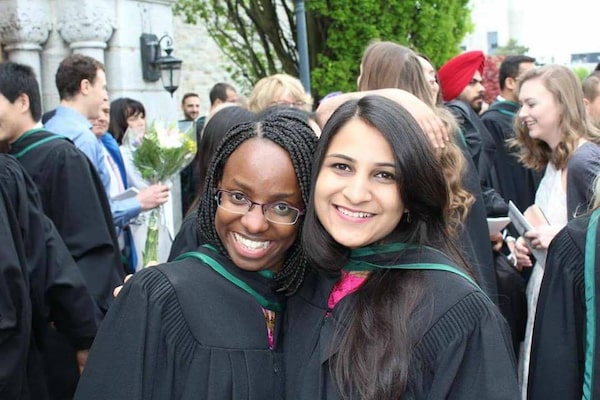
Helen Kobusinge, left, with classmate Divya Tulapurkar, graduated with MBAs from the Smith School of Business at Queen’s University in Kingston.
The Globe's business-school news roundup.
Uganda-born Helen Kobusinge knew she wanted to study abroad for her MBA, with Canada one of four possible destinations.
Then an accountant with Deloitte in Kampala, Ms. Kobusinge chose Canada in 2015 partly for its immigration policies that, unlike Britain and the United States, offer a postgraduation work permit of up to three years for eligible candidates.
"This opportunity I found was much better in Canada than other countries," says Ms. Kobusinge, who graduated this spring from Smith School of Business at Queen's University and now works as a senior accountant for KPMG in Kingston.
Ms. Kobusinge is one of a growing number of international students – including a small but growing contingent from Africa – who are pushing Canada up the charts as a preferred study destination.
Related: American MBA students drawn to Canada's diversity
Read more: International students flooding some Canadian business schools with applications
New data on potential applicants to global business schools, released recently by the U.S.-based Graduate Management Admission Council, show that between 2009 and 2016 Canada muscled its way onto a top-five list of international study destinations. The United States and Britain typically are preferred choices, but last year Canada moved into second place (from fifth in 2009) as a destination for prospective MBA students from Africa.
Over the same period, Canada climbed into third spot (from fifth in 2009) for students from Central and South Asia, and stood fifth last year as a preferred location for prospective students from the United States and the Middle East.
Some credit Canada's favourable profile to anti-immigrant policies in the United States and Britain that impose study and postgraduation restrictions on foreign students. But researchers caution it is too early to assess the full impact of inward-looking practices reshaping overseas study choices.
Canada stands out to potential candidates, says GMAC director of research Gregg Schoenfeld, for the relative ease in securing a work permit after graduation. As well, Canada is seen as a relatively safe and secure destination.
"It seems to be government policies affecting student mobility toward Canada," he says, with an immigrant-friendly outlook providing Canadian schools with a useful recruitment tool. "Schools may want to highlight government policies about work visas, work permits and the relative ease of getting a student visa."
With a three-year work permit, for example, graduates such as Ms. Kobusinge have time to apply (as she is doing) for permanent residency in Canada.
The uptick in overseas MBA applications to Canada is a positive development for many schools, not least as foreign students pay a tuition premium. But the growth in interest in Canada also carries responsibilities, warns David Dunne, director of full- and part-time MBA programs at the University of Victoria's Gustavson School of Business.
"It is not easy for these students to come and slot into Canadian culture," he says, with the onus on schools to create a supportive environment for foreign students. At Gustavson, with two-thirds of the MBA class from overseas, the entire cohort participates in a three-week orientation that includes time outdoors (including the woods) to learn about sustainability, a signature theme for the school.
"Some get scared by it [the outdoor experience] but it is a very supportive experience and you really bring home to them the importance of sustainability," says Dr. Dunne, adding that students also meet local First Nation leaders during the orientation.
"[As a school] you are looking for a particular type of student with a particular background based on your school and you are looking to create a diverse experience for your domestic and international students," he says. "You have to back it up with a good experience."
That was the case for Ms. Kobusinge who laughs that she had never lived in a country where temperatures dip below 16 C. Despite the "huge cultural change" in coming to Kingston, she describes her one-year MBA studies at Smith as a "once in a lifetime experience." She had offers from other Canadian schools but chose Smith for the strong early support from school staff and alumni that continued after her arrival.
"They made my experience so easy," she says. "They made me feel like I was just driving a few miles to a different city."
She also received a $30,000 Forté Fellow scholarship that includes networking and other support for female MBA candidates.
As Canadian business schools look to capitalize on increased interest from international students, including from Africa, Ms. Kobusinge urges Canadian recruiters to show up in person at MBA fairs around world.
That's the strategy of Rotman School of Management at the University of Toronto which this year reported a 35-per-cent increase in applications from Africa. After an absence, Rotman plans to send recruiters to MBA fairs in Nigeria, Kenya and South Africa this fall, according to a school spokesman.
Researcher and teacher named interim dean at Sprott
Carleton University's Sprott School of Business in Ottawa has named one of its own, Linda Schweitzer, as interim dean for 13 months, pending the selection of a successor to dean Jerry Tomberlin. On July 1, Dr. Thomberlin becomes the university's acting provost and academic vice-president for a two-year term.
Dr. Schweitzer, who teaches knowledge management in the MBA programs, is also associated with two of the school's research units – one on information, technology, organization and people, and the other on women and work.
Follow Jennifer Lewington and Business School News by subscribing to an RSS feed here or via Twitter @JenLewington.
Contact Jennifer at jlewington@bell.net